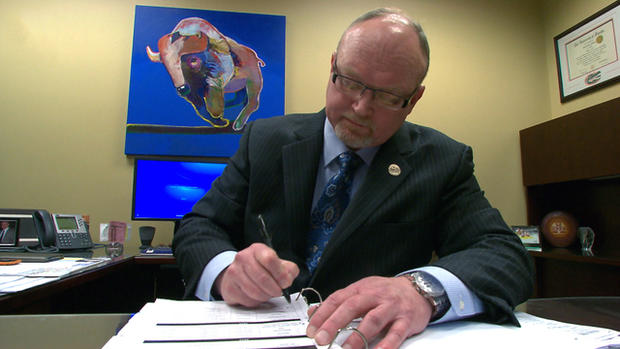Insurance industry under investigation
Audits of the nation's biggest insurance companies have uncovered a systemic practice of insurers not paying benefits on millions of policies - even when the companies knew the policyholder was deceased. Lesley Stahl reports that 25 insurance companies, without admitting wrongdoing, have agreed to pay more than $7.5 billion in back death benefits in a series of settlements reached with states across the country. Thirty-five companies still have not settled and remain under investigation. Stahl's report will be broadcast on 60 Minutes, Sunday April 17 at 7 p.m. ET/PT.
Insurance companies have long maintained that it is up to policyholders' beneficiaries to contact the insurance company and to file a claim in order to collect whatever death benefit may be due them. But if beneficiaries are unaware of the policy, they don't know to file a claim - something that happens with surprising frequency, says Kevin McCarty, the insurance commissioner of Florida who led the task force investigating the industry. McCarty says the insurance companies don't reach out to the beneficiaries -- even when the insurers know of the policyholder's death. "What we found is that companies have actual knowledge in their files that people have died, yet they have neglected to initiate an investigation and pay the claim," he tells Stahl.
One way insurers learned of someone's death was through the use of the Social Security Administration's Death Master File. McCarty says that many insurance companies used the Death Master File to their advantage, cutting off annuity, or retirement, benefits to policyholders when they died-- but not using it to notify beneficiaries that they're owed a death benefit.
McCarty is bothered by that practice. "I'm here to say that you have a responsibility to investigate a claim if you know someone has died," he says.
What's even worse, says McCarty, is a practice he discovered involving whole life policies in which many insurers continued to make premium payments to themselves using their dead customers' money. What happened, McCarty says, is that policyholders built up a cash value in their policies over time, a nest egg they could access while alive. But after they passed away, many of the insurance companies drained down that accrued cash value to pay themselves premiums. It's a tactic originally designed to keep a policy in force if the holder has lost the financial ability to pay premiums. But in this case, McCarty says it's adding insult to injury. "Oh, by the way. If you stick that policy in a shoe box and stick it in your closet, not only are we not going to look for you, but we're going to take all the cash value in it... Give it back to the company. And leave your beneficiary with nothing. Here, sign here."
